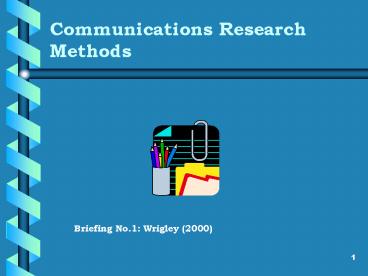Communications Research Methods - PowerPoint PPT Presentation
1 / 25
Title:
Communications Research Methods
Description:
GO TO LMU Library Online. Click on Journals. Journal of Public Relations Research ... to Johnson and Duberley(2000) and Benton and Craib(2001) there are many ... – PowerPoint PPT presentation
Number of Views:40
Avg rating:3.0/5.0
Title: Communications Research Methods
1
Communications Research Methods
Briefing No.1 Wrigley (2000)
2
Reading
- BrymanBell Part 3, esp chs 13, 15, 16, 19
- DaymonHolloway
3
Locating the article
- My website in pdf format, OR
- EBSCO
- GO TO LMU Library Online
- Click on Journals
- Journal of Public Relations Research
- On the Web via EBSCO - select Business Source
Premier service - Search using Wrigley and Glass ceiling in the
fields provided - Full reference needed in Harvard style
4
(No Transcript)
5
Area topic Purpose
- Clear definitions of GC?
- Gendered Pay promotion issues
- P.30 PURPOSE of the Research
- Fits in with prior research?
- Whats new about this study?
6
Backgd, context, concepts
- See eg Official govt studies?
- 1991 study
- Any change since 1991? Evidence?
- Census? Catalyst studies?
- Entrepreneurship an alternative?
- Womens enthusiasm for change versus resignation
7
Backgd, context, concepts
- Some concepts include
- Compensatory feminism
- Denial
- Gender socialization,
- Sex discrimination, etc
8
Backgd, context, concepts
- See RESEARCH PROBLEM section
- Mens attitudes
- Previous studies
- THE GC is important for 5 reasonssupported by
previous studies and references
9
Res qs
- General Q p30 This study..
- (much the same as the purpose)
- 3 specific research qs to be stated
- RQ1
- RQ2
- RQ3
10
Relevant Literature
- Several Previous studies and place into a
hierarchy if possible - GrunigToth (seminal authors?)
- Etc
- Relationship of this study to previous writers
- Is it dismissive?, modifying? Or building on the
past studies?
11
Perpectives the range
- According to Johnson and Duberley(2000) and
Benton and Craib(2001) there are many
EPISTEMOLOGIES, including - Positivism
- Interpretivism
- Critical theory
- Feminism
- Postmodernism
12
Perpectives
- Mainstream empiricism based on Positivist
Epistemolgy Is NOT Wrigleys approach! - FEMINIST INTERPRETIVISM?
- See BB ch 13 for The nature of Qual research
- The researcher-subject relationships for
Feminism
13
Substantive theory
- New /old theories mentioned? used? Tested?
- Eg Festinger (1957) cognitive dissonance (Psych)
- Wrigley re-conceptualises as
- Negotitated cognitive dissonance
14
Methods Data
- QUAL Methods
- See BB ch 13 for The nature of Qual research
- See chs 23, 15 and 129 of BB
15
Methods
- Does the author follow the steps of qualitative
researching as laid down by BrymanBell? - Any criticisms of qualitative research?
16
The process of qualitative research
1. General research questions
5b. Collection of further data
2. Select Research sites and subjects
3. Collection of Relevant data
5a. Tighter specification of the research
question(s)
4. Interpretation of data
5. Conceptual and theoretical work
6. Write up Findings/ conclusions
17
Research process in the real world
- The previous slide represents an idealisation of
the research process - In the real world the process is seldom as pure
or stylised - Set out a diagram showing the process that you
think the author used in this article. - Describe the links and main components.
- Is the research organised into 2 stages?
18
Methods and data
- Data collection via Questionnaire ?
- Interviews?
- Documentation analysis?
- Pre tests. Why?
- Focus Groups?
- Sampling justify the size, techniques, frame,
response rate. (BB, ch. 4)
19
Methods
- Ads/Disads of the methods of data collection
used - Define reliability and validity in QUAL methods
see Trustworthiness authenticity in BB and
apply these criteria to Wrigley.
20
Consent, ethics??
- Who is excluded and why?
- Possibility of bias?
- See p.36 in Wrigley.
21
Research reporting
- The 5 factors and relate to What the author
trying to show - Do the reponses ever appear contradictory?
- Is this what you would expect?
- Strategies for overcoming GC discussed
22
Research reporting
- The 5 factors again seen through 2 perspectives
- Radical Feminist (define)
- Liberal feminist (define)
- Why so much emphasis on the various
perspectives?? - Do the researched use terms like feminism?
23
Research reporting
- Limitations Wrigleys reflections on her work
- Reflexivity
24
Research Opportunities
- Never the last word.
- Implications for theoretical development
- Challenge for future researchers (p.51-52)
- Practical implications in the workplace
25
Research Opportunities
Some Final thoughts from Wrigley and
yourselves! Provide an Article B by way of
contrast Eg QUANTITATIVE SURVEY Best of luck !































